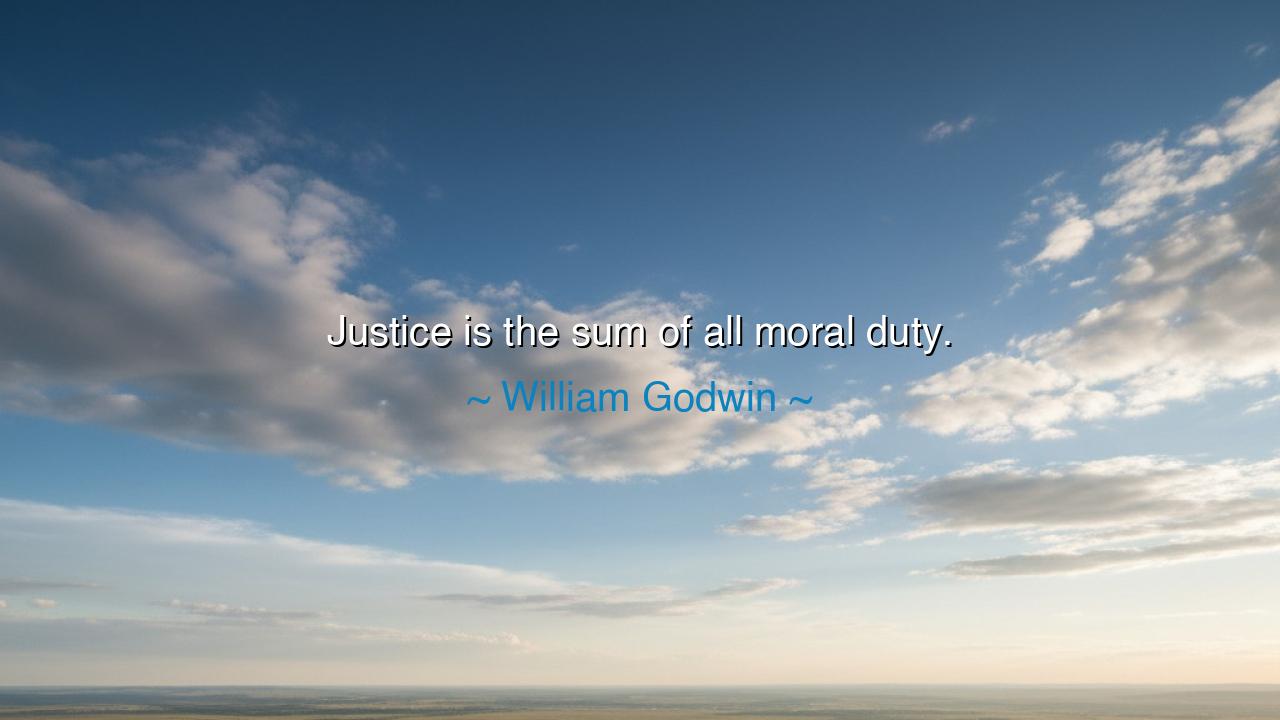
Justice is the sum of all moral duty.






Hear now the solemn wisdom of William Godwin: “Justice is the sum of all moral duty.” This saying, though brief, is vast as the ocean. For within it lies the essence of human conduct, the binding force of community, and the measure of our worth before one another. Godwin, a philosopher of the Enlightenment, believed that society could be shaped not by chains or crowns, but by reason and conscience. In his vision, justice was not a single virtue among many, but the crown of them all—the gathering together of every noble act of duty into one radiant whole.
To say that justice is the sum of moral duty is to declare that every obligation of man—whether to his brother, his neighbor, or the stranger at the gate—flows into the great river of justice. Moral duty is the seed, but justice is the harvest. If one tends the duties of honesty, kindness, courage, and compassion, then justice blooms. If one neglects them, then justice withers, and society falls into ruin. Thus, Godwin’s words remind us that justice is not merely the province of courts and judges—it is the daily work of every soul.
History provides its witness. In the days of King Ashoka of India, after his conquest of Kalinga, he saw the rivers of blood, the cries of the wounded, the emptiness of victory. His heart was struck with remorse, and he turned to the path of dharma—of moral duty. He declared that true kingship was not conquest, but service; not oppression, but compassion. His edicts carved in stone proclaimed kindness to animals, tolerance of faiths, and protection of the weak. In fulfilling the moral duty of a ruler, Ashoka sought the higher goal of justice, proving Godwin’s insight centuries before it was spoken.
And yet, Godwin’s teaching also serves as a rebuke. For how often have men spoken of justice while neglecting their moral duties? How often have rulers cried out for law and order, even as they themselves betrayed honesty, mercy, and humility? Justice without moral duty is a hollow shell, a mask worn by the unjust to deceive. But where duty is practiced with sincerity, justice does not need to be proclaimed; it shines forth like the dawn.
The lesson of this teaching is plain: if you would live in a just society, do not look only to laws or rulers. Look first to your own moral duties. Treat your neighbor fairly. Speak truth even when it costs you. Care for the weak when it is inconvenient. Each act of duty is a stone laid in the foundation of justice. Without such stones, no palace of law can stand. With them, even the humblest village may become a sanctuary of righteousness.
Therefore, let each soul take up the task. Let children be taught that justice is not only in courts, but in their treatment of playmates. Let merchants remember that fair dealing is as sacred as prayer. Let leaders understand that every decision, whether small or great, must balance upon the scale of moral duty. For when all perform their part, the sum becomes unshakable, and justice reigns not as an ideal but as a lived reality.
Practical actions flow from this: seek always to fulfill your daily duties with integrity. If you are an employer, guard the well-being of your workers. If you are a citizen, uphold the truth in speech and deed. If you are a parent, teach compassion by example. In doing so, you weave yourself into the greater fabric of justice, which is the inheritance of humanity and the promise to generations yet unborn.
So remember well the words of Godwin: “Justice is the sum of all moral duty.” Carry them as a lamp for your path. For if each person tends faithfully to the duties placed before them, justice will not remain a distant dream, but will walk among us like a living presence, guiding nations, healing wounds, and binding the world together in harmony.






AAdministratorAdministrator
Welcome, honored guests. Please leave a comment, we will respond soon